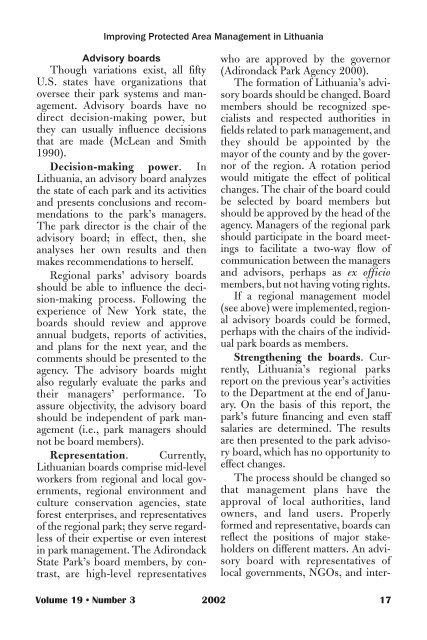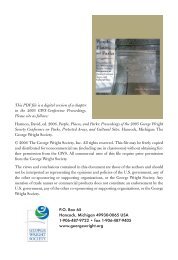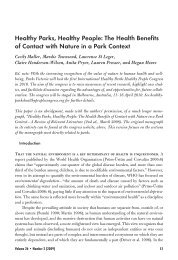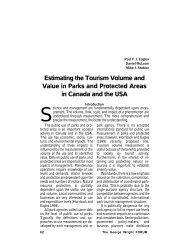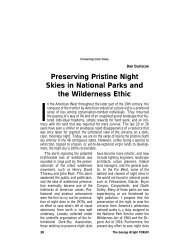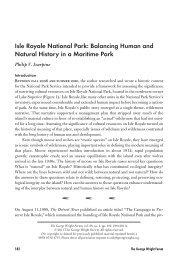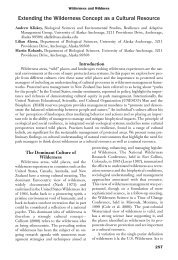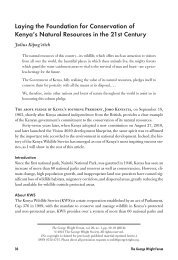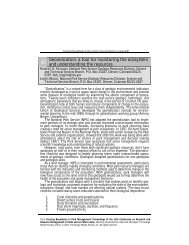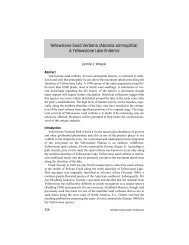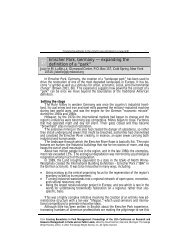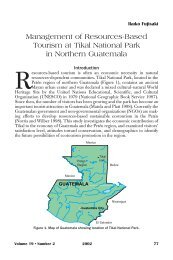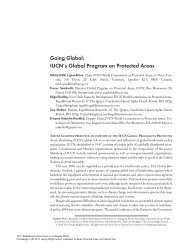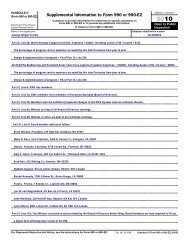Improving Protected Area Management in Lithuania - The George ...
Improving Protected Area Management in Lithuania - The George ...
Improving Protected Area Management in Lithuania - The George ...
You also want an ePaper? Increase the reach of your titles
YUMPU automatically turns print PDFs into web optimized ePapers that Google loves.
<strong>Improv<strong>in</strong>g</strong> <strong>Protected</strong> <strong>Area</strong> <strong>Management</strong> <strong>in</strong> <strong>Lithuania</strong><br />
Advisory boards<br />
Though variations exist, all fifty<br />
U.S. states have organizations that<br />
oversee their park systems and management.<br />
Advisory boards have no<br />
direct decision-mak<strong>in</strong>g power, but<br />
they can usually <strong>in</strong>fluence decisions<br />
that are made (McLean and Smith<br />
1990).<br />
Decision-mak<strong>in</strong>g power. In<br />
<strong>Lithuania</strong>, an advisory board analyzes<br />
the state of each park and its activities<br />
and presents conclusions and recommendations<br />
to the park’s managers.<br />
<strong>The</strong> park director is the chair of the<br />
advisory board; <strong>in</strong> effect, then, she<br />
analyses her own results and then<br />
makes recommendations to herself.<br />
Regional parks’ advisory boards<br />
should be able to <strong>in</strong>fluence the decision-mak<strong>in</strong>g<br />
process. Follow<strong>in</strong>g the<br />
experience of New York state, the<br />
boards should review and approve<br />
annual budgets, reports of activities,<br />
and plans for the next year, and the<br />
comments should be presented to the<br />
agency. <strong>The</strong> advisory boards might<br />
also regularly evaluate the parks and<br />
their managers’ performance. To<br />
assure objectivity, the advisory board<br />
should be <strong>in</strong>dependent of park management<br />
(i.e., park managers should<br />
not be board members).<br />
Representation. Currently,<br />
<strong>Lithuania</strong>n boards comprise mid-level<br />
workers from regional and local governments,<br />
regional environment and<br />
culture conservation agencies, state<br />
forest enterprises, and representatives<br />
of the regional park; they serve regardless<br />
of their expertise or even <strong>in</strong>terest<br />
<strong>in</strong> park management. <strong>The</strong> Adirondack<br />
State Park’s board members, by contrast,<br />
are high-level representatives<br />
who are approved by the governor<br />
(Adirondack Park Agency 2000).<br />
<strong>The</strong> formation of <strong>Lithuania</strong>’s advisory<br />
boards should be changed. Board<br />
members should be recognized specialists<br />
and respected authorities <strong>in</strong><br />
fields related to park management, and<br />
they should be appo<strong>in</strong>ted by the<br />
mayor of the county and by the governor<br />
of the region. A rotation period<br />
would mitigate the effect of political<br />
changes. <strong>The</strong> chair of the board could<br />
be selected by board members but<br />
should be approved by the head of the<br />
agency. Managers of the regional park<br />
should participate <strong>in</strong> the board meet<strong>in</strong>gs<br />
to facilitate a two-way flow of<br />
communication between the managers<br />
and advisors, perhaps as ex officio<br />
members, but not hav<strong>in</strong>g vot<strong>in</strong>g rights.<br />
If a regional management model<br />
(see above) were implemented, regional<br />
advisory boards could be formed,<br />
perhaps with the chairs of the <strong>in</strong>dividual<br />
park boards as members.<br />
Strengthen<strong>in</strong>g the boards. Currently,<br />
<strong>Lithuania</strong>’s regional parks<br />
report on the previous year’s activities<br />
to the Department at the end of January.<br />
On the basis of this report, the<br />
park’s future f<strong>in</strong>anc<strong>in</strong>g and even staff<br />
salaries are determ<strong>in</strong>ed. <strong>The</strong> results<br />
are then presented to the park advisory<br />
board, which has no opportunity to<br />
effect changes.<br />
<strong>The</strong> process should be changed so<br />
that management plans have the<br />
approval of local authorities, land<br />
owners, and land users. Properly<br />
formed and representative, boards can<br />
reflect the positions of major stakeholders<br />
on different matters. An advisory<br />
board with representatives of<br />
local governments, NGOs, and <strong>in</strong>ter-<br />
Volume 19 • Number 3 2002 17


